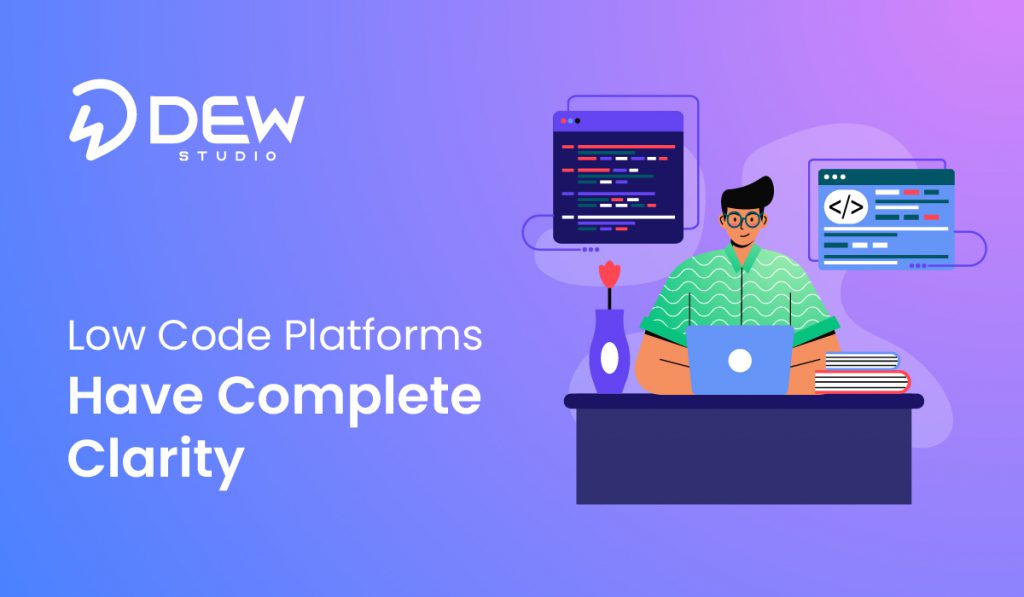
How are low-code platforms revolutionizing software development for IT developers?
Nowadays, businesses are constantly seeking new ways to enhance their agility and streamline their application development processes. One groundbreaking solution that is gaining immense popularity is low-code platforms. According to recent research, the low-code development market is projected to reach a value of $27.23 billion by 2024, growing at a compound annual growth rate of 26.0%.
But what exactly are low-code platforms?
Imagine a software development environment that empowers IT developers to build and deploy applications rapidly, with minimal hand-coding required. This game-changing approach enables businesses to reduce development time significantly, enabling faster time-to-market.
Business users and IT teams collaborate more effectively, and the demand for Angular low-code platforms rises primarily due to the need for faster time-to-market and increased efficiency. This collaborative approach accelerates application delivery and improves communication and alignment between business stakeholders and IT departments.
In this blog post, we will read about the key features of the best low-code platforms for IT developers in 2024, along with the benefits of each feature.
Visual Development Environment
A visual development environment is a hallmark feature of low-code platforms that allows IT developers to design and build applications using drag-and-drop components and visual models rather than writing code line by line. This feature significantly accelerates the development process by enabling developers to quickly create user interfaces, workflows, and logic with minimal effort.
Benefits:
- Increased Productivity: IT developers can rapidly prototype and iterate on applications, reducing development time and boosting productivity.
- Simplified Debugging: Visual models make it easier to identify and troubleshoot issues in the application logic, leading to faster debugging and problem resolution.
Seamless Integration Capabilities
Effective integration capabilities are essential for Angular low-code platforms to enable developers to connect to external systems, databases, and APIs with ease. The best low-code platforms in 2024 will offer seamless integration capabilities, allowing IT developers to build complex applications that leverage data from multiple sources.
Benefits:
- Enhanced Connectivity: Seamless integration capabilities enable IT developers to tap into a wide range of data sources, enhancing the functionality and usability of applications.
- Streamlined Processes: Integration with external systems automates data exchange and streamlines business processes, improving operational efficiency.
AI and Machine Learning Tools
As AI and machine learning continue to play a pivotal role in digital transformation, low-code platforms equipped with AI and machine learning tools will empower IT developers to incorporate intelligent capabilities into their applications. These tools include pre-built AI models, natural language processing, and predictive analytics features.
Benefits:
- Advanced Functionality: AI and machine learning tools add advanced capabilities to applications, enabling IT developers to create intelligent systems that can make data-driven decisions.
- Predictive Insights: By leveraging AI and machine learning algorithms, IT developers can extract valuable insights from data and deliver predictive analytics to end-users.
Multi-experience Development
In 2024, the best low-code platforms will support multi-experience development, allowing IT developers to create applications that deliver a seamless user experience across various devices and channels, such as the web, mobile, and chatbots. This capability is crucial for meeting the demands of omnichannel users in today’s digital age.
Benefits:
- Enhanced User Engagement: Multi-experience development ensures consistency in the user experience across different touchpoints, increasing user engagement and satisfaction.
- Flexibility and Scalability: IT developers can build scalable and adaptable applications for different devices and form factors, enabling businesses to reach a wider audience.
Collaboration and Version Control
Effective collaboration and version control capabilities are pivotal for IT developers working in teams to build applications using low-code Angular platforms. These features enable seamless communication, code sharing, and tracking changes, ensuring they work together efficiently and effectively.
Benefits:
- Team Efficiency: Collaboration tools facilitate real-time communication and collaboration among team members, promoting synergy and teamwork in application development.
- Code Reusability: Version control capabilities allow IT developers to reuse code snippets, components, and templates across projects, saving time and effort in development.
Containerization Support
Containerization support is becoming an essential feature of modern low-code platforms, as it allows IT developers to package applications and their dependencies into lightweight, portable containers. This feature provides flexibility, scalability, and portability for application deployment in different environments.
Benefits:
- Isolation and Security: Containerization ensures that applications run in isolated environments, enhancing security by reducing the attack surface.
- Portability and Scalability: Developers can easily deploy containerized applications across different environments, including on-premises and cloud-based infrastructure, providing scalability and flexibility as needed.
Mobile App Development
The ability to develop mobile applications will be a critical feature for low-code platforms in 2024. IT developers require tools and frameworks that enable them to create mobile apps with native-like performance, seamless integration with device capabilities, and support for offline functionality.
Benefits:
- Wider Reach: Mobile app development capabilities allow developers to build applications that cater to the growing mobile user base, expanding the reach of the software.
- Offline Functionality: IT developers can create mobile applications that can function without a network connection, providing a reliable user experience in various scenarios.
Progressive Web App (PWA) Support
Progressive Web App (PWA) support is another valuable feature that low-code platforms should provide IT developers in 2024. PWAs combine the best of web and native app experiences, offering offline support, push notifications, and the ability to be installed on a device’s home screen.
Benefits:
- Cross-Platform Compatibility: PWAs can run on different devices and platforms, eliminating the need for separate development efforts for each platform.
- Improved Performance: PWAs provide fast and responsive user experiences with features like offline caching, resulting in higher user engagement and satisfaction.
DevOps Integration
DevOps integration is crucial for low-code platforms in 2024 to support the continuous integration and delivery of applications. IT developers should be able to seamlessly integrate with popular DevOps tools and workflows, enabling them to automate build, test, and deployment processes.
Benefits:
- Continuous Delivery: DevOps integration empowers IT developers to deliver software updates faster and more frequently, enhancing the agility and responsiveness of the development process.
- Collaboration and Efficiency: Integrated DevOps workflows facilitate collaboration between developers, testers, and operations personnel, ensuring smoother handoffs and increased efficiency in the software development lifecycle.
Low-Code AI Assistants
As artificial intelligence (AI) continues to advance, Angular low-code platforms in 2024 can leverage AI capabilities to assist IT developers with various development tasks. Low-code AI assistants can provide code suggestions, automate testing, and generate boilerplate code based on user requirements.
Benefits:
- Productivity Boost: Low-code AI assistants help IT developers by automating repetitive tasks and providing intelligent code suggestions, reducing development time and improving productivity.
- Code Quality Assurance: By offering automated testing capabilities, low-code AI assistants assist in detecting potential errors and bugs, ensuring better code quality at the early stages of development.
Wrapping Up
The low-code platforms available to IT developers in 2024 will offer an array of advanced features to accelerate application development, improve connectivity, and harness the power of AI and machine learning.
So, what are you waiting for? Adopt Angular low-code technology and expand your development potential. Start exploring and experimenting with these innovative platforms today and witness the incredible transformation in your application development process.
Take the lead in shaping the future of your organization—step into the world of low-code and propel your business into the future.


